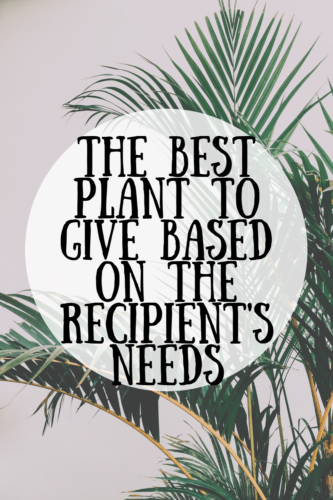
There are several reasons you may be shopping for a gift. Giving gifts to loved ones and close friends on special occasions, such as birthdays, is customary. Some special events could send you to the store, such as graduations and weddings.
The plant and flower industry generated over $15 billion in sales in 2020. It’s common to give significant others roses on Valentine’s Day, and many people buy poinsettias at Christmastime. Shopping for plants can be challenging since there are hundreds of thousands of vascular and flowering plants to consider. Let’s look at how considering the recipient’s needs can help you find the perfect plant.
Avoid plants that trigger seasonal allergies.
Seasonal allergies are allergies triggered by an airborne substance from a plant. Approximately 60 million Americans suffer from seasonal allergies.
When you’re shopping for someone with seasonal allergies, focus on allergy-friendly plants, such as begonias, cacti, and daffodils. Referring to the Ogren Plant Allergy Scale System (OPALS) is a great way to identify pollen-free plants that won’t trigger allergic reactions.
Using an allergy calendar is a great way to know when seasonal allergies affect people in your location. While many suffer during the spring allergy season, ragweed triggers seasonal allergies in the fall, and grass triggers seasonal allergies during the summer. The seasonal allergy calendar enables users to identify which allergies spike each month of the year in your location.
An allergy calendar is also an excellent tool for event planning. Suppose you’re planning a birthday party for a friend with seasonal allergies. Using this tool enables you to determine when it’s safe to plan an outdoor event without risking allergic reactions.
Shop for pet-safe plants for pet owners.
Many plants are dangerous for pets, and if you’re shopping for someone with cats or dogs, you’ll want to avoid toxic plants. Cats and dogs may vomit if they ingest poinsettias. Lilies, chrysanthemums, and daffodils are also unsafe options for pet owners.
When you’re shopping for pet owners, the best plant to gift should be pet-friendly. Money tree, Chinese money plant, spider plant, cat palm, and Boston fern are all pet-friendly houseplants you can consider. Other pet-friendly options include succulent wreaths and peacock plants.
Buy low-maintenance plants for people with limited free time.
Perhaps you’re shopping for someone who appreciates nature but doesn’t have much free time. Focus on low-maintenance plants such as succulents, paddle plants, peperomia, lady palms, pothos, and Chinese evergreen plants. These plants only need to be watered occasionally, enabling them to thrive with minimal care.
People that love to cook will appreciate herbs.
Herbs are plants used to produce fragrances or flavor food. Adding herbs to food dishes enhances the flavor. Rosemary, parsley, oregano, mint, and thyme are great kitchen plants for people who love to cook because they can clip fresh leaves when they need them.
Plants are great gifts for people struggling with health issues.
Plants extract toxins from the air and produce fresh oxygen, improving indoor air quality while protecting residents from the harmful effects of toxins such as benzene, mold spores, and formaldehyde. Sore throats, sneezing, coughing, and irritated eyes are all symptoms of exposure to mold spores. Snake plants, peace lilies, English ivy, and chrysanthemums are some of the best plants for eliminating toxins. Aloe vera’s an excellent option for reducing toxins and tackling insomnia because it produces fresh air that helps people sleep.
Consider plants suited to their mental health needs.
Gardening lowers cortisol levels, making plants a great gift option for people with mental health issues. You might opt for succulents or other low-maintenance plants if you’re shopping for someone struggling with depression. Successfully caring for a plant can boost your friend’s confidence, making a snake plant an ideal option because it thrives with dry soil.
There are hundreds of thousands of plants you could give someone. Considering their needs will help you find the perfect plant.





Leave a Reply